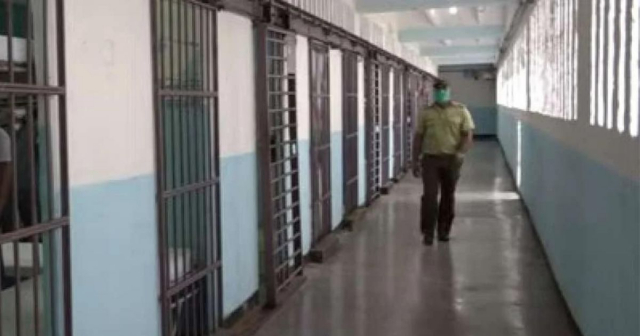Relatives of the political prisoner of July 11 (11J) Luis Barrios Díaz, who died on Sunday at the age of 36, denounced that his death could have been avoided and considered it a murder by the Cuban prison authorities.
Carlos Hernández, the protester's brother-in-law, published a video explaining that the prisoner was denied medical attention even though the doctors recommended his immediate admission, because there was no oil to relieve the police who were supposed to take care of him or antibiotics at the Miguel Enriquez hospital in Havana.
The young Cuban was in Prison 1580 in San Miguel del Padrón, and since August he became ill with pneumonia, states the publication, posted on Twitter byPrisoners Defender.
Hernández says that on November 14, some friends went to visit him in prison and found him very deteriorated. At that moment Barrios Díaz told them that they had taken him to the Miguel Enriquez hospital and the doctors gave him an order to admit him, but the guards who accompanied him refused to admit him "because they did not have oil for the officer who was supposed to relieve them, and that there was no antibiotic in the hospital to treat it.
The prisoner gave his friends a telephone so that his sister, Aurora Santos Díaz, could contact Captain Gerardo and insist on his need for medical attention.
"He had a very bad bronchopneumonia, a lot of shortness of breath, and he was very deteriorated. I have been in the family for 20 years and I met him when I was 16. He sent a phone number to my wife so that she could contact Captain Gerardo and the captain He asked for antibiotics to treat him, but they didn't.taken to the Combinado hospital, but they left it in 1580," said Hernández, who is Aurora's husband.
He explained that his wife met with the captain and she asked him to visit him personally to check on his health. Apparently Gerardo paid him a visit because they immediately transferred him to Covadonga, in El Cerro, where they were going to make an incision in his lung because there was a lot of fluid.
After this procedure – where they removed one and a half liters of fluid from one lung and determined that the second was very damaged – the authorities expeditiously gave him a three-month extra-penal freedom license at the same hospital, he stressed.
That night the prisoner spent the night recovering and was taken to Intensive Care.
The doctor meets with the family and tells them thatBarrios Diaz He is delicate, they brought him some broth and yogurt to give him.
The young man's sister made the food and left at 7:30 pm for the hospital, but five minutes later they called the house to report that the prisoner had died of respiratory arrest.
The doctor said that the patient died because the illness was not treated in time: "I want everyone to see this, I can be judged for this, but it doesn't matter because the truth has to be known. The prison directors have committed a murder," said Hernández, who is in Cuba and assures that he does not belong to any political organization.
He says that the doctor asked permission to perform an autopsy on Barrios Díaz for suspected tuberculosis.
"He was a healthy man, who only went out to protest on July 11. He left behind a six-year-old child, a sister, a mother, and a devastated family. I don't belong to anything, to any political organization, no one is paying me, I just want justice. I especially send this message to journalist Albertico, who said that the prisoners in Cuba were well cared for. The prisoners are without human rights in Cuba's prisons," he denounced.
Barrios Díaz, 37, was sentenced to six years in prison for 11J, accused of alleged crimes of public disorder and attack.
The Cuban Observatory of Human Rights has reiterated its demand for the immediate release of all prisoners for political and conscientious reasons and recalls that although it is a matter of political will, the regime has at least eight legal avenues to release or release them immediately. to all.
The case of Luis Barrios joins other complaints of inmates who show obvious deterioration in health, such as the case of Félix Navarro and José Daniel Ferrer.
In the final segment of its complaint, the Cuban Observatory for Human Rights demanded international attention from democratic governments and the European Union (EU) to the critical situation of prisoners in Cuba.
What do you think?
SEE COMMENTS (1)Filed in:
